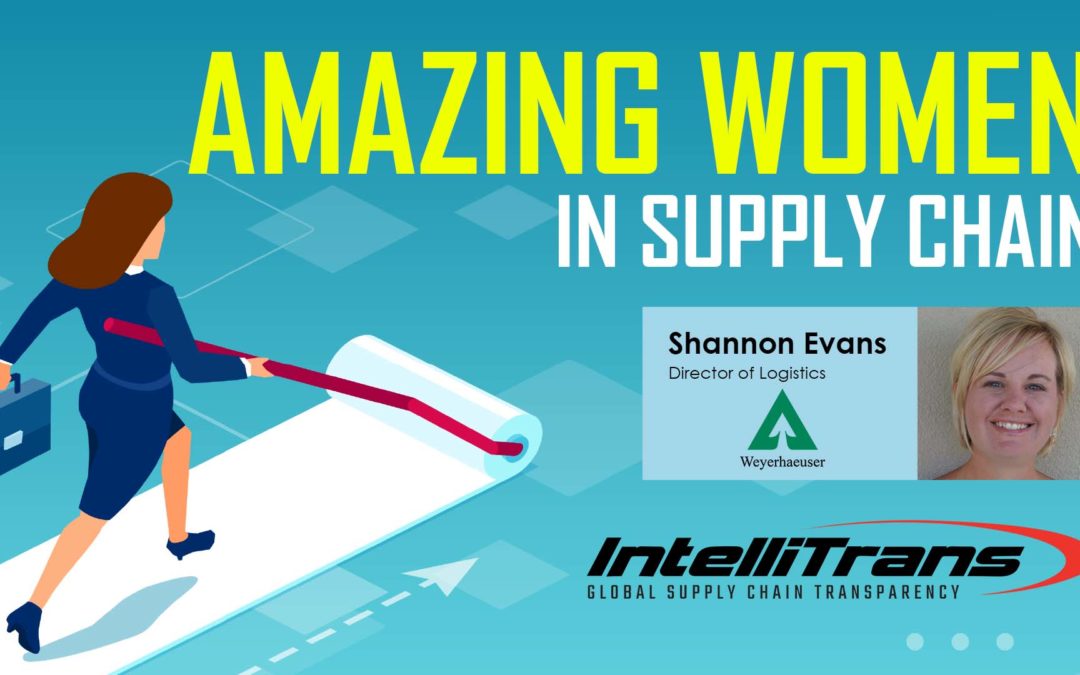An expert in all things logistics, Shannon Evans of Weyerhaeuser recognizes that supply chain technology is the key to the industry’s future.

It’s been about 18 years since Shannon Evans started her supply chain journey with Weyerhaeuser, a Seattle-based company that owns around 11,000,000 acres of timberlands in the US and manages an additional 14,000,000 acres of timberlands under long-term licenses in Canada. Prior to joining Weyerhaeuser, Evans worked as an inside sales rep for Willamette Industries (which was acquired by Weyerhaeuser in 2002).
Evans, who has a degree in finance, made her foray into supply chain as a logistics analyst. When her husband, who is a national account rep for Weyerhaeuser, was transferred to Hot Springs, Ark., Evans took off for a couple of years to raise their young child. She later returned to her logistics analyst position and—through her work supporting Weyerhaeuser’s Southern Lumber Division—became a senior analyst across all wood products.
After serving in the role of transportation manager for the company’s Southern Lumber Division based in Hot Springs, Evans moved into her current position as Director of Logistics – Eastern Division. Today, she and a team of 12 associates handle all of the outbound products for Weyerhaeuser’s wood products business east of the Rockies in the US, managing oriented strand board (OSB), engineered wood products (EWP), lumber and distribution.
Managing Transportation Complexities
As Director of Logistics at one of the world’s largest timberland companies, Evans is well aware of the myriad freight, transportation and supply chain challenges that organizations are grappling with right now. “I’d guess that everyone right now would say the truck and driver situation is keeping them up at night,” Evans said, noting that the situation continues to deteriorate versus improve. “We lost a lot of drivers during the pandemic and haven’t been able to get them back into the industry, and particularly for over-the-road (OTR).”
To ensure that it has enough trucks to ship its products, Weyerhaeuser rolled out a Core Carrier Program about 11 years ago. “It’s one of the first things I did in my role as a leader in our transportation department,” recalled Evans, who closely manages that program and makes yearly decisions concerning what percentage of the company’s freight will be allocated to the Core Carrier Program.
“We’re always trying to increase our committed capacity and looking at where dedicated trucking makes sense,” said Evans, “while also exploring the rise of the digital freight matching platforms and how we can better utilize those in our company.”
Weyerhaeuser is also very interested in how technology, software and automation can help optimize different aspects of its business. It works to automate as many supply chain management processes as possible and uses optimization tables within CARRIERPOINT TMS to ensure that it meets the contracts set forth in its Core Carrier Program.
“We’ve also worked with IntelliTrans to build rate-bid tools to automate the negotiation of rates in the system, provide analytical visibility and automate that process,” said Evans. “We’re always looking for ways that we can use technology.” Working with IntelliTrans, Weyerhaeuser has also built a shipping kiosk app (also within CARRIERPOINT TMS). An electronic bill of lading solution, the app enables a very streamlined, paperless and touch-free process for the driver check-in process.
“A driver can use a smartphone or tablet to do the entire check-in process from his or her cab,” said Evans. “We’ve been working on the concept for a while, but we really hit fast forward on it as a result of the COVID-19 pandemic.” Evans is currently working through an implementation calendar to implement the app across additional Weyerhaeuser sites through 2022.
The Only Woman in the Room
As this Amazing Woman in Supply Chain looks around at her industry, she’s seeing more women in management and leadership roles, but still not enough to make a big impact on the industry’s gender diversity balance. “My counterpart out west is also female, which is pretty unique. You don’t see that a lot in this field,” she said. “There are still many meetings (e.g., manufacturing, sales team or carrier meetings) where I look around and I’m the only female in the room.”
To women exploring the career opportunities in supply chain, Evans said her best piece of advice is to get educated and up to speed on any topics that you’ll be discussing in either group or one-on-one meetings. “I’ve found that you gain more respect that way,” said Evans, who reads a lot and does copious amounts of research to make sure she’s “over prepared” for any meeting she attends.
“I always have a lot of facts, figures and data on hand,” she added, “because I do feel like it’s really important to earn that respect and credibility.”
Up to the Challenge
When Evans first started in the supply chain industry, there were no college majors or programs dedicated to the sector. Now, very few colleges don’t have some type of program, major, minor or certification for supply chain and logistics. “It’s kind of crazy how the supply chain industry has exploded over the last few years,” she said. “I think a lot of companies have realized the importance of supply chain, and logistics in particular.”
Looking ahead, Evans is anticipating a new, 3-year project that will find her supporting an upgrade to a newer, enhanced version of the company’s SAP enterprise software. “This will be a project that touches every segment of our company,” said Evans, who will be spending 50% of her time as the track lead for the plan-to-ship portion of that project. She’ll also be looking at Weyerhaeuser’s transportation solutions and how they fit with the new SAP environment.
Evans is up to the challenge. “I have a lot of passion around technology and any way, shape or form that we can use to enhance what we do,” she added. “I’m pretty excited to work on that and spend half of my time working on something that I’m really passionate about.”

